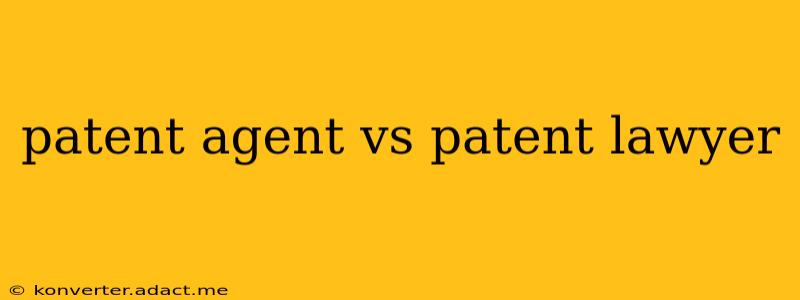Choosing the right legal professional to navigate the complex world of patents can be daunting. Many people are unsure about the key differences between a patent agent and a patent lawyer. While both can help you secure patent protection, their qualifications and permissible actions differ significantly. This article will clarify the distinctions, helping you make an informed decision for your intellectual property needs.
What is a Patent Agent?
A patent agent is a registered professional with the United States Patent and Trademark Office (USPTO) who is qualified to prepare and prosecute patent applications. They undergo rigorous examinations to demonstrate their expertise in patent law and procedure. Crucially, patent agents do not need to hold a law degree. Their expertise stems from a strong scientific or technical background, coupled with specialized training in patent law. This background often allows them to deeply understand the technical intricacies of inventions, which is invaluable during the application process.
What can a Patent Agent do?
Patent agents are authorized to perform many of the same tasks as patent lawyers, including:
- Conducting patentability searches: Investigating existing patents to determine the novelty and non-obviousness of an invention.
- Drafting and filing patent applications: Preparing the necessary documentation for submission to the USPTO.
- Prosecution of patent applications: Responding to office actions from the examiner and arguing for the allowance of the patent.
- Maintaining patents: Handling renewal fees and other administrative tasks related to keeping a patent in force.
However, there's a key limitation:
What is a Patent Lawyer?
A patent lawyer is a licensed attorney who specializes in patent law. They possess both a Juris Doctor (JD) degree and are admitted to a state bar. This legal background gives them a broader scope of practice than patent agents.
What can a Patent Lawyer do?
Patent lawyers can perform all the tasks of a patent agent and more, including:
- All the tasks performed by a patent agent.
- Providing legal advice on broader intellectual property matters: This might involve licensing agreements, infringement disputes, and other legal issues related to patents.
- Representing clients in court: Patent lawyers can represent clients in litigation concerning patent infringement or validity.
Patent Agent vs. Patent Lawyer: Which Should You Choose?
The choice between a patent agent and a patent lawyer depends largely on your specific needs and the complexity of your situation.
-
For simpler patent applications with straightforward technology: A patent agent may be a cost-effective choice. Their technical expertise can be highly valuable, and their fees are often lower than those of a patent lawyer.
-
For complex inventions, or situations involving litigation or broader IP issues: A patent lawyer is likely the better option. Their legal training equips them to handle more intricate situations and represent clients in court.
How Do I Find a Qualified Professional?
The USPTO's website provides a searchable database of registered patent agents and attorneys. You can use this database to find professionals with the necessary qualifications and experience in your field of technology. Remember to check reviews and testimonials before making a decision.
Can a Patent Agent Become a Patent Lawyer?
Yes, a patent agent can become a patent lawyer by obtaining a Juris Doctor (JD) degree and passing the bar exam in their desired state.
What is the Cost Difference?
Generally, patent agents charge lower hourly rates than patent lawyers. However, the overall cost will also depend on the complexity of the invention and the scope of work required.
Are There Any Ethical Considerations?
Both patent agents and patent lawyers are bound by ethical rules and regulations. It's crucial to choose a professional who maintains the highest ethical standards and acts in your best interests.
By understanding the distinctions between patent agents and patent lawyers, you can choose the best professional to help you protect your intellectual property effectively and cost-efficiently. Remember to thoroughly research potential candidates and select someone with the appropriate expertise for your specific situation.
